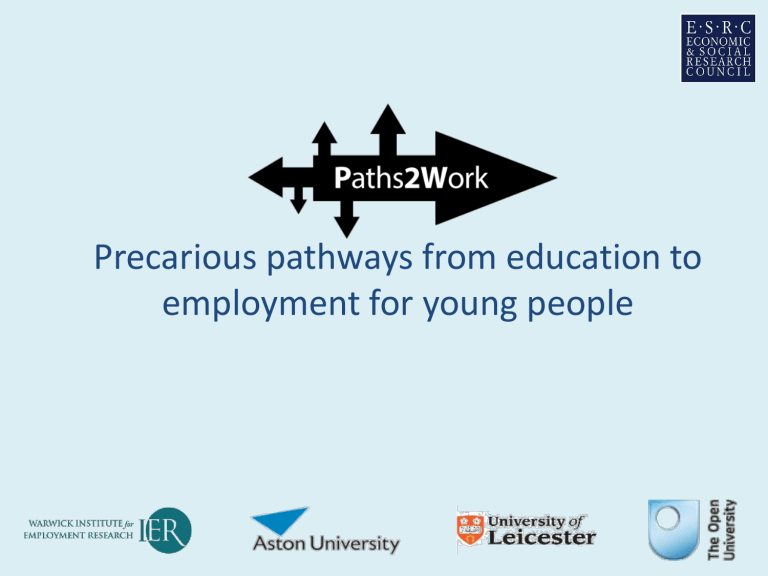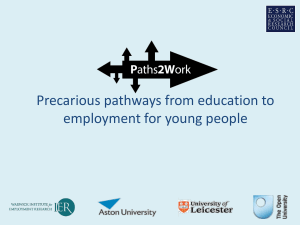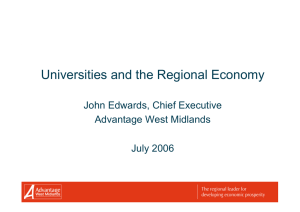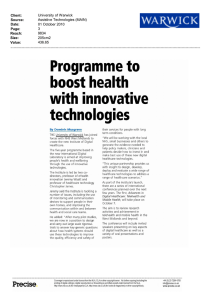
Precarious pathways from education to employment for young people Precarious pathways from education to employment for young people Year 2 Year 1 Project1 Young Transitions people’s from pathways education to into employment employment the ininprevious Midlands recessions. during previousabout Lessons recessions policy and in the Midlands practice from in the 1930s the 1930s and and 1980s? Project 2 Project 3 Pathways into employment for school and college leavers Graduate pathways into employment Project 4 Employers’ perspectives on the recruitment of new labour market entrants Year 3 1980s? Coordination of findings from all the projects: The role of non-standard employment, work experience, unpaid work and internships in the transition from education to employment in the Midlands (and lessons from the past) Young people’s unemployment benefits in the 1930s Part of Project 1: Policy & Practice: historical & geographical perspectives Matthew Cooper, PhD student, IER Key Research Questions • How do authorities decide who should receive what help? – What criteria are used to assess claims and assign people between different systems? – Who gains what rights (if any) as a consequence? • What conditions are then attached to that help? – Such as job search monitoring and sanctions, ‘test and task’ work, ‘workfare’, detention in institutions, compulsory training? How did this work in Birmingham in the 1930s? • Unemployment benefits divided between Insurance based benefits (run nationally), and the rebranded poor law (locally). • Young people divided between ‘Juvenile’ (1418) and adult (18+) claimants. Different groups are subject to very different treatment. How did this work in Birmingham in the 1930s? Two themes of particular interest: (i) Exclusion of outsiders • National government policy is to encourage mobility of labour. Setting up schemes to help young and juvenile unemployed relocate to prosperous areas, like Birmingham. • But…Birmingham LA is keen to limit rights of migrants to poor law assistance and to send unemployed back. • In any case practical problems. Low wages mean difficult for young people to live outside of family home. (ii) Disciplining of insiders • Policy for ‘juveniles’ was of compulsory attendance at a Juvenile Instruction Centre. The over 18s were subject to little compulsory training. • Benefits could be withdrawn for non attendance. • Aimed to promote board based employability and prevent ‘demoralisation’ through school like set-up. The differences and similarities between 1930s and current and recent policies will be a key theme in my analyses as the research progresses. Project 2: Precarious Pathways for nonGraduates Phil Mizen, Charoula Tzanakou and Gaby Atfield Factors related to getting a job Qualifications Experience Employment Personal attributes Skills “[Experience is] what employers actually look for nowadays, they don’t actually look for qualifications anymore” Neil, 18, Birmingham Getting Experience to get Experience “Say if you want to be in retail you have to have experience in retail before you get in there” Hayden, 17, Birmingham “Say there’s three of youse in an interview, three of youse getting picked for a job, any one of youse gonna get it, the kid with no experience or the kid with some experience or the kid with loads of experience, obviously the kid with loads of experience is gonna get chosen, so if you have loads of experience, you’ve got no problem” Kenan, 18, Coventry Work experience can particularly important – For those who want to find work quickly and easily – ….who want to work part-time to fit around study, family commitments, etc. – …..who want to try out particular types of work – ……have no other routes into the labour market “It’s not the best jobs but it’s something that gets you money, you know, puts money in the back of your pocket, you know, got to grab what you take, basically.” Steven, 18, Coventry Work experience develops basic skills and confidence • Importance of soft skills, directly and indirectly: “Before I started my first job, I couldn’t talk to anyone, and after having a part-time job for about nearly two years, I could come into a place like this and talk to absolutely anyone, get on with them and know what to do basically” Brett, 22, Birmingham Instrumental value - Personal attributes • Having had a job shows that you have the characteristics and attributes necessary to have a job – you are ‘job ready’ • Overcoming stereotypes: – young people are lazy, unreliable, unwilling – racial and religious stereotypes Obtaining Qualifications (i) Earning and learning as a route to gaining qualifications or to make up for not having them: “Apprenticeships are probably the easiest way of getting like into work” David, 21, Coventry “It’s alright having the social life, going out after school with your mates or messing around in maths or stuff like that, but you need your GCSEs, you need to know the stuff, if you wanna go somewhere in life you don’t wanna be how I was” Amy, 19, Coventry Obtaining Qualifications (ii) Apprenticeships “If it was just like work experience for these four years, rather than getting a qualification or a degree, I think I would have gone for a degree, just to have something to fall back on. In case I didn’t like [it] say then if I didn’t have any qualification I wouldn’t be able to go into any other field so it would be a lot more of a risk, I feel, if there wasn’t a qualification at the end of it” Tamsin, 18, Birmingham …but not always! “I don’t understand retail because retail say that you need maths and English but with the technology that we’ve got we don’t need to know anything, like technically, because the cash machine’ll sort everything out for you, so technically you don’t need nothing” Demi, 17, Birmingham How work experience can work to restrict or limit job and career opportunities • By its absence • By not being the ‘right kind’ • By conflicting with the aspirations to study • By needing money to earn money • By competitive pressures A deficit of work experience; and the vicious circle this can create “I think it’s hard because no one wants to employ someone’s who’s got no experience, then no one will employ them to get the experience and then they can’t get a job.” Kema, female, 17, Leicester […] “but then a lot of jobs [are] asking for experience as well, [but] you’re not give a man an opportunity to gain experience, [so] how you supposed, how you supposed to take on someone with experience? […] they ask for experience but yet they don’t give no opportunity to gain experience.” Azmil, male, 19, Birmingham A deficit of work experience; and feeling excluded “It’s like I don’t like writing my name, kind of thing because […] I don’t want people to know I’m Muslim ‘cause of the discrimination of them not giving me a job […] I don’t really want people to know, it’s like, it’s not like I’m ashamed, it’s just that it’s gonna stop opportunities.” Aaeesha, 17, female, Birmingham “I went to [Public Sector service provider] and they said no either [as well], so I was like “Okay, forget about work experience then!’ […] Like, I wear a headscarf. And maybe my skin”. Ulyaa, female, 17, Coventry [I will] “give an example, know one of my mates, yeah, […] He’s got a beard, he’s a holy person. He’s got a beard and everything, yeah. He applied for a job [at a high street chain], I applied for the job yeah, I’ve got the job straightaway [… but] they phoned him ‘ah we’ve got no vacancies’ and by then other people have phoned in and getting jobs. That’s racism”. Azim, male, 19, Birmingham Problems in finding the ‘right kind’: and what this might say to employers “[…] I never put any of mine [short term agency jobs] on my CV, I only put like the main ones … Yeah, the main ones that you need.” Dora, female, 19, Coventry […] “if an employer looks at your CV and they see loads of things like, even if it’s agency and stuff, they’re going to look at that and they think, well you’ve had all these jobs in this amount of time and they’re going to be like, well obviously it just shows you’re not employable because you’ve only been there for this amount of time.’’ Tanya, female, 21, Coventry Problems in finding the ‘right kind’: to ‘live’ on or make it worthwhile “You can’t rely on a zero-hour contract, you can’t, how can you live off a zero-hour contract? You don’t know what you’re earning, one month you’re earning [£]500, the next month you’re earning £20. How can you live off that? You can’t and you can’t rely on those sort. What we need, what we need is jobs that are, like proper contracts.” Abahat, male, 18, Birmingham “[…] we’d get a phone call every morning, yeah, from, like whoever’s working at the agency, and they’ll phone me and they’ll say, ‘are you available to work tonight?’ […] and they used to say pass the message on to your mates as well […] there used to be three other agencies as well […] so that altogether […] there’s about 80 people there .[…] the managers would come up, who are working the sections and they’ll say okay […] ‘We only need 70 people tonight’, and then with the other 10 people they used to say to them, ‘Go home.” . Mo, male, 19, Birmingham ‘ Combining work experience with study “[…] you’ve gotta make it clear the days and hours you can do, so say on a Monday I can only work after 4 o’clock and anything from 4 onwards, Tuesday all day, like you have to make it clear ‘cause if they want you to come in on Monday at 12, then you’ve gotta think work or college.” Lottie, female, 17, Leicester “[high street retailer], yeah, there were terrible, yeah, so you got zero contract hours. Even if you said you’re at college they’d ring you at 6 in the morning saying, ‘we need you to work at 9 [am]’, then sometimes you don’t, don’t want the shift, sometimes you don’t have any shifts in the week.” Yaw, male, 18, Coventry Work experience requires having money “I think it was more, yeah, more the location [of his unpaid work experience] really, and obviously to get there you’d have to have money, even if you were getting a bus you need money, you know, you’ve got to have money at the end of the day, you know, you can only volunteer for a short period of time before the realism of life gets in the way and that’s a fact, unfortunately”. Sean, male, 19, Coventry “Every month, every day I was travelling up and down, up and down, going to different stores [to provide security] and know what I mean, that’s how much graft I put in. I mean in a week I probably spent silly money in taxis and buses to get to work […] but until you get a permanent site but because of the zero-hours contract, nothing’s promised, nothing’s promised”. Azmil, male, 19, Birmingham These assessments are the product of effort: trying and often failing. Too many young people … “[…] a few of my friends are managers there [supermarket] and […] they get loads of CVs and […] most of them just get thrown away, straight away they don’t even look at them […] because they’re getting loads of applications all the time”. Luther, male, 17, Birmingham “Well, when you apply for a job there’s always gonna be someone that’s got a better qualification than you have, and they’re gonna want them over you, so you’re not really given much of a chance.” Joe, Leicester, male, 18 … chasing too few opportunities “There’s a lot of people that would want to work, want to graft but you’re not giving them the opportunity to graft, how they supposed to graft? And put in work. There’s not opportunities to show that you’re willing to like graft, yeah. You get me?” Stacey, 17, female, Leicester Progression • Progression within a job vs progression between jobs – Insight into organisation/role – Building a CV • Apprenticeships – leading to progression? – Public (City Councils, NHS) – Private sector • Agency, short term temporary jobs – dead ends? Progression • Progression within a job vs progression between jobs – Insight into organisation/role – Building a CV • Apprenticeships – leading to progression? – Public (City Councils, NHS) – Private sector • Agency, short term temporary jobs – dead ends? Progression • Progression within a job vs progression between jobs – Insight into organisation/role – Building a CV • Apprenticeships – leading to progression? – Public (City Councils, NHS) – Private sector • Agency, short term temporary jobs – dead ends? Susan, 19 • • • • • Lived independently since 15 Did A levels Worked part time along college (Arts) Volunteering activity for young people College tutor, and advisors provided support, information and guidance • Signed on • Apprenticeship level 3 at City Council • Apprenticeship level 4 opportunity I don’t [want] just a job, I want a career’ Robert, 21 • Lives in shared accommodation • Low educational attainment • Worked in zero hour contracts (construction, catering, sales) • Many short term employment experiences • Signed on and off (long term unemployment spells) • Apprenticeship level 2 • Dyslexia • Currently unemployed (JSA) ‘[Employers/Agencies] can promise you the world but they don’t actually deliver on their promises’ Project 3: Midlands graduates’ pathways into employment Emerging findings…… Kate Purcell, Charoula Tzanakou and Gaby Atfield Key findings • Graduates had undertaken a wide range of paid and unpaid work and work experience placements before, during and after graduation and most had experience of precarious employment. • Almost all work experience before, during and immediately after HE study has positive impacts on career opportunities…but some work experience was more valuable than others. • Information about opportunities and access to them varies substantially among the graduate population. • Some sectors and occupations are harder to access than others. • Increase in self employment and aspirations to be selfemployed, compared to earlier graduate cohorts. • Polarization of opportunities and outcomes within the graduate labour market? How work experience works to enhance career opportunities: some examples • …by leading directly to sustainable employment; • …by leading indirectly to employment (skills development, evidence of ‘employability skills’, access to information and guidance, ‘insider information’, references…; • ..by helping to clarify options, skills and preferences and shaping career directions. Leading directly to sustainable employment “I think, I mean I wouldn’t have gotten the [Name of Company] job without having done volunteering work for them […]At that time, that job was essentially created for me.” Alexandra, biological sciences, studied and worked in Midlands ”I spoke to the director who had hired me [for the sandwich placement] and she wanted to offer me a job but I had already told her that I didn’t want to.” Neal, technical project manager, engineering, studied and worked in Midlands Leading indirectly to employment “that [unpaid work as assistant clinical psychologist] was my first experience of being in a NHS setting so understanding… the meeting structures, booking appointments on clinical systems that they use[…] I was able to use when when I did have my interview for [current job in NHS]” Adina, Employment Lead in Healthcare Unit, Psychology, applied, studied and worked in Midlands “main thing was just that I had lots of work experience. I’d been used to working in different, all kind of people both voluntary and paid experience and I’d got .. just much more relevant experience than other people […] Yeah, definitely, I honestly, hand on heart, don’t think I would have got the jobs that I have now if I hadn’t have done it [work experience(s)]. Like, I think it’s given me much more than just the experience, it’s given me a lot of the things that I developed when I was doing those…. things like social skills, and self-confidence and the ability to speak to people and present and do those types of things - and those are things that I never got from school”. Kate, psychological well being practitioner, social studies and social work,applied, studied and worked in Midlands Helping to clarify options “I was really glad that I did nine months and got a good insight into the kind of business and realised that I wanted to work for a big international company but I didn’t want to do accountancy or audit […] and I sort of realised that it probably didn’t quite fit my skill set, or my interest.” Adrian, Senior Underwriter, Economics and French, studied and worked in Midlands “I think they [unpaid work experiences] definitely helped me identify the things that I enjoy doing and the things that I was naturally good at […] they’ve kind of influenced my choices.” Adina, Psychology, applied, studied and worked in Midlands Stepping Stones to cumulative career advantage “I mean, the degree that I did helped me, has enabled me to work in engineering which I enjoy, so designing things and that kind of stuff, and then that led me to the internship which was interesting and then, get onto the exchange programme which I enjoyed and the company here which is also part of [the latter]”. Neal, technical project manager, engineering, studied and worked in Midlands Michael in Pharmacy: 1st unpaid community pharmacy [holiday work before university, then paid in subsequent summer], 1st unpaid hospital pharmacy placement student, 2nd paid hospital pharmacy, - paid sandwich year internships hospital and in industry, then paid pre-registration industrial internship – finally, PhD scholarship. Michael, now completing PhD, Pharmacy, applied and studied and worked in Midlands Some examples of how work experience can also restrict opportunities • It amplifies existing inequalities: – of information and ‘cultural capital’ – In access to mentors and useful networks – Of access to social and economic support – Of mobility and location Restriction of job access opportunities and amplifying existing inequalities • Importance of information and ‘cultural capital’ • Importance of access to mentors and useful networks • Importance of access to social and economic support • Importance of mobility and location Importance of information & cultural capital: “I don’t think I received good enough careers advice prior. Obviously I did my degree thinking that I would be able to do things and then when I graduated I found out that I couldn’t go down that route, for example, with the children’s mental health. I thought doing the degree in itself was enough, they hadn’t advised that you’d then have to work in that area for two years” Kate, Psychological well-being practitioner, social studies and social work, Applied from, studied in and worked in Midlands Importance of access to mentors & useful networks: “I wrote them a letter, an email and they ignored me so then my dad happened to be at a conference where one of the members of the board was speaking and he went up to them and complained that they’d ignored my email” Max, Chief Marketing Officer, International Relations and Russian, Applied from and studied in the Midlands Importance of economic and social support ‘Working for free’ and ‘paying to work’ – Role of family as a support network determining access to the most useful types of work experience – Decision-making as an individual and as part of a family / wider network The geography of opportunity – Sectoral differences – Role of family as an anchor, limiting mobility Economic support “I didn’t manage to keep my toe with, with archaeology or anything heritage related when I was working as a van driver. Even though it was only part-time, finding the time around that to do something else always seems really difficult [...] I don’t have enough money to be able to just go where the work is at the moment really” Logan, Heritage, Archaeology, Applied from, studied in and worked in the Midlands “A lot of my friends were moving back home and then able to get experience that way, by relying on their parents, whereas that was something I wasn’t comfortable to do which meant that maybe I wasn’t able to pursue my perfect career. That’s not to say I’m not happy doing what I’m doing...” Beth, Events Manager, Biological Sciences, Applied from, studied in and worked in the Midlands Mobility and location “I found [the charity sector] was so London centric, if you wanted to do any kind of internship, you would maybe get expenses but you’d need to be able to rely on someone to live, you know?” Beth, Events Manager, Biological Sciences, Applied from, studied in and worked in the Midlands “I’ve got my family here, things like that, my mum’s disabled so I like to be around her. She’d kill me if she knew I was staying around for her but I don’t want to be moving too far away, she needs help with things sometimes” Logan, Heritage worker, Archaeology, Applied from, studied in and worked in the Midlands Increased self-employment among graduates • Evidence of changing approaches to career development and work/life balance? • New forms of work, facilitated by ICT? • Result of greater precarity or increased enterprise and interest in self-determination? Why do you want to set up your own business? “ I think for me it’s, it’s a control thing.. being in this industry, you only have so much influence. I can work with different clients and suggest things, but sometimes when they’re dead set on having something that isn’t necessarily gonna work, or they want to take control and write things for you, even though you’re the professional writer, that is something that I do find quite difficult and I find quite stressful - whereas I think if I expand my writing portfolio sort of to be able to write expertly, for all sorts of different platforms, having the ability to actually choose the clients that I want to work with and develop stronger relationships with fewer people, I think it would just make it a little bit more satisfying for me…. …and I see friends and people that I know, have taken the leap and are making it work and making money from it and they’re just enjoying a better quality of life than doing a nine to five slog, and I think that, that’s kind of what appeals to me… I’d like to take risks and do something different and be able to have a more fulfilling career.” Julie, Creative Sponsorship and Promotions Account Manager, Regional radio company, degree in Mass Communication and Documentation, Midlands born and bred, studied in Midlands. “What do you hope to be doing in five years’ time?” “Running my own company, in what sector I’m not one hundred per cent certain but I like I’d hope the company had received its first financing and that we had a business plan and a market strategy and we were starting to take on our first employees and the company was strong …” Interviewer “So what sector doesn’t matter, that’s quite interesting - you must have an idea of what this organisation would look like and what kind of clients it would have and what kind of services it would be providing?” “Not necessarily. I’m currently with a partner starting a small project in Brussels but it’s a small one that we may get some financing for, and that’s in the policy analysis sector [but]..the sector honestly doesn’t matter so much; I considered offers from people I know, to do something in the IT sector and I mean, it’s got to be interesting to me, obviously, and it’s also got to be sort of morally acceptable and I wouldn’t work in arms …or gambling or something. beyond that I’m quite open-minded, it depends what I’m doing at the time and where I think the best opportunities are”. Max, Chief Marketing Officer, Multinational Manufacturing organisation, studied International Relations and Russian, studied in the Midlands Other key findings that we will be exploring • Careers are not individual decisions (importance of partnerships, family). • Internships – why organisations offer them and whether they lead to employment. • The role of employment agencies viz grad careers. • The range of graduate experiences and outcomes and the importance of networks, contacts and access to information: graduate labour market polarisation? • The crucial importance of proactivity. • The implications of graduate opportunities (and lack of them) for the Midlands in the future. Putting the evidence from Projects 2 and 3 together… • Work experience important for both, for similar reasons, but contacts/networks/access to guidance very different for Projects 2 and 3 • The impact of peer and reference groups and experience on awareness of, access to and attitudes towards opportunities and employment. • The importance of self confidence and the capacity for proactivity. • The need to address social and economic disadvantage more effectively to combat youth labour market polarisation. Proactivity for creating work experience “More places are formalising [work experience] though, and in a way that makes it harder, so in my case, I applied for placements that didn’t exist because nobody was normally asking the people I asked, they’re actually ‘yeah.. free pair of hands for a few weeks would be quite nice’, whereas if it’s an advertised placement then you’re competing against a lot of people”. [Alexandra]??? When employers want you to have 10 years of experience before the age of 22 Project 4: Employers’ Perspectives Professor Melanie Simms (University of Leicester) ms745@leicester.ac.uk Professor David Wilson (The Open University) David.Wilson1@open.ac.uk Employer perspectives – Advantages and disadvantages of using different forms of labour (work placement, internships, paid, unpaid etc.) • Not assuming that this is simply the stereotypical perspective of exploitative capitalism. This is a testable proposition which, to our knowledge, has not yet been addressed by formal research. – How do employers view the transition from education to employment? • What schemes are in place such as internships, placements, apprenticeships and how effective do employers see these as being in the transition into more full-term employment? • Where employers operate multiple schemes (e.g. apprenticeships and unpaid placements), which do they see as more effective and why? Key Research Questions • Does work experience per se, or only certain types of work experience, or work experience undertaken in some contexts, increase young people’s access to employment opportunities? • Under what circumstances does part-time and temporary employment lead to full-time jobs and career opportunities? • Where work experience is an informal arrangement, unpaid or otherwise organised outside the labour market, how and why are decisions made by employers to provide these opportunities? • Who accesses them, who benefits from them and who is placed at a disadvantage? • Do we need to re-think management and employment theories which have had a long history in management theory? Data Collection • 6 case studies of different size employers – organisations identified largely from projects 2 and 3 to aid integration across the projects. • Interviews - supplemented by an exploration of the nature of work, job design, and managerial systems operating in the workplace in order to build a view of the wider context of employment and management • Local and sectoral labour market dynamics also explored to set the context. • Links here to project 1. A key question will be to what extent sectors have changed or remain similar for young job seekers and unpaid work. • Finally, this project aims to examine a large case study in which all four projects can have a voice and make a contribution. Currently looking at a professional services organization, but final choice will depend on in-depth access being granted. Pilot Studies • 3 initial interviews (one manufacturing; one service organisation, one health) with more planned as the project gathers momentum. • Initial data indicate: – Unpaid workers often difficult to manage, especially in services. – Private employment agencies taking a larger role in placing unpaid work in public sector organisations. – Significant decrease in favouring graduates in preference to home-grown non-graduates who can be trained and socialised on the job. Thank you for your attention. Contact us: Paths2Work@warwick.ac.uk www.warwick.ac.uk/paths2work @Paths2Work



